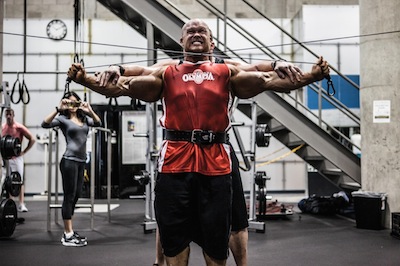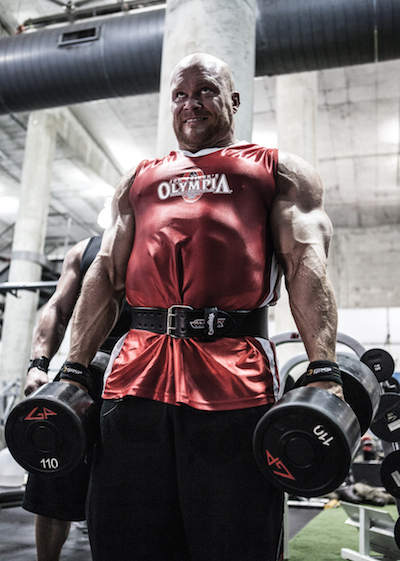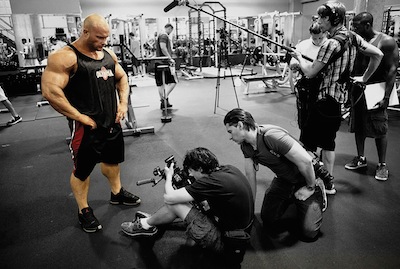One-on-One Interview with Ben Pakulski

Ben Pakulski Interview
A lot of articles start off with something like, “There are two kinds of bodybuilders …” We know what they mean, but, come on, there are more than two. It’s easy to consider many comparative twosomes—old school or new school, no carbs or carbs, HIT or HVT— the list goes on. However, I can’t start this article with the aforementioned intro. Ben Pakulski simply takes a very intelligent approach to bodybuilding. But I can’t say, “There are two kinds of bodybuilders: those who take an intelligent approach and …” And what, the moron approach?
Be that as it may, it puts Pakulski in a league with no real counterpoint. However, look at his approach to bodybuilding and you can easily see what sets him apart from most Olympia contenders.
Finishing 11th in his first Olympia and second in the Arnold, having graced the covers of MuscleMag, Flex, and MUSCLE INSIDER (breaking our own requirement for a Mr. Olympia win when we featured him in 2012), and being one of eight Olympia contenders featured in the acclaimed bodybuilding documentary Generation Iron, Ben has removed any doubt that “Canada’s most successful IFBB pro bodybuilder” is well on his way to iron stardom. The icing on that cake is called Mi40, Ben’s unique training system, which is selling like wildfire online.

MUSCLE INSIDER: All of this can only start in one place, and that’s the gym. Of all that you’ll read about Ben Pakulski, the thing in which everyone is most interested is how you train.
BEN PAKULSKI: I started weight training when I was 17. I got really strong, but I didn’t have awesome bodybuilding genetics. I’m not like Phil Heath, who just looks at a weight and blows up. I had my work cut out for me. If I wanted to be a pro bodybuilder (which I did), I needed to do a lot of research and focus on specific aspects of my training. I had to do things optimally.
MI: Well, obviously, that approach brought you through a slew of class victories and right on up to the coveted status of IFBB professional. But, most rookies out of the gate seem to stumble their first time on the pro stage. I wouldn’t say you got spanked your first time out, but I’m sure seventh at the 2010 NY Pro wasn’t what you were shooting for.
BEN: Not at all. I took that show very seriously. I did nothing for eight months but eat, sleep, and train twice a day. I gained 18 pounds of stage weight in eight months. Taking seventh was bad enough, but I lost to some bodybuilders that I thought were not all that good. I had to figure out what the hell was going on here. I took a step back and looked at the contest pics. I had worked so hard and done so much for so long. But maybe I wasn’t as good as I thought. It was discouraging. So I decided I needed to do something different.
MI: When you say “something different,” are you talking about reps and sets? Some sort of variety of training protocols? Fat instead of carbs? Different is kind of a broad topic.
BEN: Different in that I had to address my physique. My weaknesses were very weak, but my strengths very strong. So, I needed to come up with a way to even out my physique. I had to change what I had been doing in favor of something better.
MI: Well that’s some fork in the road for an IFBB pro. A total regroup of sorts. What did you do and how did you do it?
BEN: I was lucky enough to meet a guy who did something called Muscle Activation Techniques (MAT). Basically, my right knee hurt, and I went to him to treat it. Well, he started working on my feet! I said, “Hey it’s my knee …” He said, “Don’t worry.” When the session was over, the pain in my right knee was gone. But, it had gone to the other knee. Obviously, this guy was something else.
MI: So, he moved the pain from your right knee to your left knee by treating your feet? There must have been some alignment issue causing your pain. Did you keep going back?
BEN: I did. And I started understanding how things work. I learned how to move and optimize movements, and that has gotten me through several sticking points. The guy was brilliant. He was the catalyst to my training. He taught me movements and motor patterns that have really made a difference in my workout.
MI: Is this where you got the idea that you don’t need heavy weights? You’re an advocate of building muscle with lighter weights.
BEN: It’s true, you don’t need heavy weight. Your body distributes weight when it has to move it. If you make sure the tension goes in the right place—through a path of least resistance—the muscle will be optimally stimulated. The body doesn’t know weight. It can’t tell the difference between 175 and 225. It only senses tension— torque. I have to teach my body to put the weight where it needs to be and learn how to put as much tension on the muscle as possible. I had to use so much less weight in the beginning, but then the weights started to go back up.

MI: This all obviously leads to some very calculated and exacting movements executed with perfect form and controlled cadence. Sort of the opposite of the way Branch and Ronnie train?
BEN [laughing]: I don’t have their genetics! If I had those genetics, I would never have done this.
MI: A lot of people—many on bodybuilding forums—think it’s the drugs and not the genetics. What do you think of that sort of “informed” opinion?
BEN: It’s true! They think it’s the drugs! Guys who think like that don’t want to commit to the work. Good genetics or bad genetics, bodybuilding is hard work. The people who follow me are a little more intelligent than that. I have followers who realize there is an intelligent way to do things—the most optimal. Those are the people who follow me.
MI: I think of Mike Mentzer when you say “intelligent bodybuilding.” Was he someone with whom you could relate?
BEN: Yes. Mike Mentzer learned movement patterns, linear tension, then going to failure. People have no idea how to produce intensity. Try a quadruple drop set with a sadistic training partner. If you’re sufficiently motivated, you can go further than you think. My angle is different from Mike’s, though. I’m not giving answers. I’m giving them tools. This is absolutely the best way to train. The most logical way to train. I focus on what can I do now and what can I recover from.
MI: Was this what spawned your training system, Mi40?
BEN: Yes, it was. With Mi40, I wanted to give people what I thought were the five things I could teach them, in 30 minutes or less, that could change their lives and bodies forever. That has grown to include my five-day, three-day, and two-day instructional camps and hypertrophy seminars.”

MI: Those camps sound incredible. I imagine the time is very intensive. Okay, what’s next for you? What are you working on now?
BEN: This month, we’re releasing Mi40-X (Mi40 Xtreme). This is the next step in muscle building with new, cutting-edge techniques. There’s very interesting research out now on satellite cells and training modalities based on intra-set stretching, (if it’s loaded, not passive, so it will not make you weaker). It took 18 months to develop the program, including conducting a six-week study at the University of Tampa. Through the research, I designed my newest program around intra-set stretching, which has been shown to optimize satellite cell activation. There is a lot of research on this. The program is number one online now.
MI: You have been billed as the “most successful Canadian IFBB pro.” Why did you leave Canada?
BEN: I don’t know about that. Paul Dillett is pretty successful. I’m sure there are others. If you mean successful right now as a bodybuilder … I never looked at it that way. Being in Canada at the beginning of my career was a bit of a disadvantage. Evan Centopani and I came up at the same time. He was making $300K a year just being a bodybuilder, and I had to work a full-time job to make money. I don’t think Canada has nearly as much to offer a pro bodybuilder as the US.
MI: Is Canada not a bodybuilding-friendly country?
BEN: I don’t mean it like Canada shuns bodybuilding—not at all. Athletics in general in Canada are not very popular. Few people are into athletics. People are more concerned with academics. It’s harder in Canada. People don’t push their kids into athletics, except for hockey. There’s not a lot of emphasis placed on athletics. Canadian football sucks. We have one baseball team. As a bodybuilder, you’re frowned upon. So, I moved to Venice in 2010 to pursue the bodybuilding dream.
MI: Do you see a big difference in the US versus Canada when it comes to bodybuilding?
BEN: Definitely. Right away. People in the US will come up to me and congratulate me or ask for an autograph or to take a picture. Not in Canada. Once I moved to the US and placed well, people took me seriously.
MI: When are going to see you compete again?
BEN: The 2015 Arnold Classic.
SIDEBAR:
Generation Iron
On October 7, 2013, the bodybuilding documentary Generation Iron opened for a one-night-only event in 21 locations across Canada to sellout audiences and rave reviews. The film was supposedly made in the same vein as Pumping Iron, by the producer of that film, Jerome Gary. But beyond following eight impending champions as they train and compete for the coveted Mr. Olympia title instead of two (Louie and Arnold), the major differences between the two films are vast. And, somewhere in that vastness of difference lies Canada’s own Ben Pakulski.
“They positioned me as the Ivan Drago of bodybuilding. Probably because I was a Weider athlete and I’m different because I train in a lab is why they reached out to me.”
You train in a lab? Like, hooked up to machines?
“Yeah, at the University of Tampa. I use a lab there to do pre- and post-cardio blood work, respiratory changes, lots of things to try and extract an extra percent or two—it’s all in the film. I was the only guy who talked about supplements too. So, yeah, I was the guy training in the lab with all the science behind me. I was like a contrast to Branch, who loads it up and goes nuts.”

What was your impression of the film?
“I thought it was good, but a little too long and there was no interaction between any of us. They tried to create some rivalry, but I think it could have been better developed had we actually mixed it up with each other like Arnold and Lou did in Pumping Iron. You got to know Lou and Arnold. In Generation Iron, I don’t think you really got to know any of us. Except for Kai.”
Generation Iron pried the lid off modern-day bodybuilding at the elite level, something that has not been done since Pumping Iron. Considering how bodybuilding has since transpired, do you think that was a good thing for the sport?
“I don’t think the film portrays bodybuilding in either a good or a bad light. It just opens up the door and allows for a look inside. I think the film did a good job presenting what we do. It’s up to the individual to determine if that’s good for the sport.”

